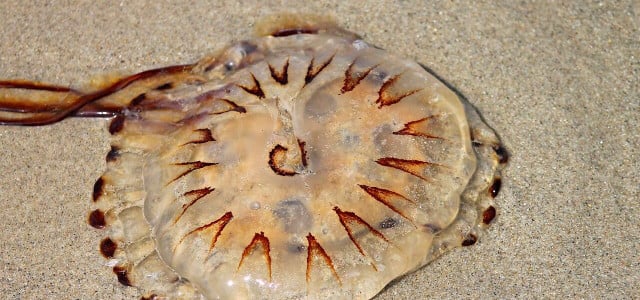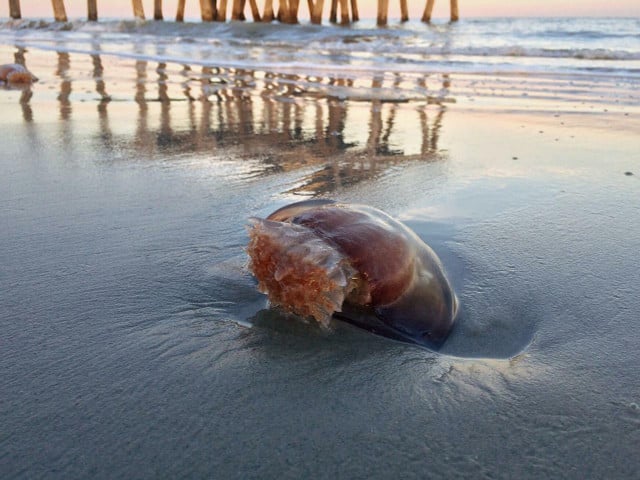
A jellyfish sting can happen on a vacation by the sea. This article tells you what to do if you get a jellyfish sting.
Jellyfish blooms are becoming more and more common in European holiday destinations. This is what large swarms of jellyfish are called. Many jellyfish species prefer warm waters. This is favored by the climate crisis and the resulting warming. Overfishing of the seas also contributes to the many jellyfish. So there are fewer of their predators and jellyfish can spread unhindered.
Various types of jellyfish can be found in the North Sea and Baltic Sea, i.e. on German beaches. These include the following specimens:
- The moon jellyfish is relatively harmless. A jellyfish sting of this kind does not cause a strong impact.
- The yellow nettle jellyfish is also known as the fire jellyfish. If you get a sting from this species of jellyfish, it can cause burning pain, but also nausea, vomiting and even unconsciousness
- A jellyfish sting can be very painful and cause reddening of the skin. As with the stinging jellyfish, a sting can also cause nausea and fainting.
You can do this with a jellyfish sting

(Photo: CC0 / Pixabay / Pexels)
The following points can help you to react correctly if you have been stung by a jellyfish:
- Try to keep calm and leave the sea. Depending on the body’s reaction, circulatory problems can occur, which is why you should never stay in the water.
- You can ask a lifeguard or other bathers for help if they are around.
- You should avoid touching and rubbing the affected area of skin. The jellyfish’s poison is in the nettle capsules, which only empty when they come into contact with the skin. There may still be unopened nettle capsules on the skin.
- The Apotheken-Umschau recommends pouring household vinegar over the jellyfish sting to inactivate the nettle cells that have not yet burst (tip: ask a kiosk about this). If there is no vinegar, helping people should carefully remove the nettle cells by hand, which according to Apotheken Umschau is harmless. Afterwards you can rinse the jellyfish sting with sea water, helpers should wash their hands with sea water. If you don’t have any vinegar on hand and you don’t see any nettle pods, just use seawater. Avoid fresh water, alcohol or disinfectants on the jellyfish sting! These liquids could increase the effects as they will rupture any capsules.
- Afterwards, you can treat the jellyfish sting with cold or heat. Cold can feel more comfortable at first. However, heat is better at deactivating the poison. A hot-water bottle or a warm cherry stone pad on the area of the jellyfish sting can therefore be helpful.
- You can get advice from the pharmacy about appropriate ointments. These may contain antihistamines or cortisone, which can ease the after-effects of your jellyfish sting.
- Be sure to seek medical advice if the pain or itching doesn’t go away.
Important: After a jellyfish sting by the life-threatening jellyfish “sea wasp” (box jellyfish) or “Portuguese galley” you should alert the emergency services immediately! The sea wasp is found mainly on Australian coasts, the Portuguese galley usually in tropical and subtropical waters. In recent years, however, it has appeared more and more frequently in the south of Mallorca.
You can reduce the risk of a jellyfish sting

(Photo: CC0 / Pixabay / Wokandapix)
The tentacles of jellyfish are almost invisible and the animals swim openly in the sea. This means that the risk of getting a jellyfish sting cannot be completely avoided. However, you can decrease them:
- When you arrive at the beach, you can take a quick look at it. If a particularly large number of jellyfish wash up here, there are probably also more jellyfish in the water, as they usually appear in swarms.
- Jellyfish avoid areas with raging surf and strong currents. Therefore, the risk of encountering jellyfish at quiet bathing spots is increased.
- Jellyfish also like to float at night. You should avoid bathing in the dark in areas with a particularly large number of jellyfish if you don’t want to risk a jellyfish sting.
- Heed warnings on the beach. If the area is known for lots of jellyfish, it is surely signposted. You may then decide to go to another beach.
Read more on Techzle.com:
- On vacation or in your own region: This is how you behave in the event of a forest fire
- Holiday planning: 5 important rules for employees
- Summer Recipes: Light dishes suitable for hot weather